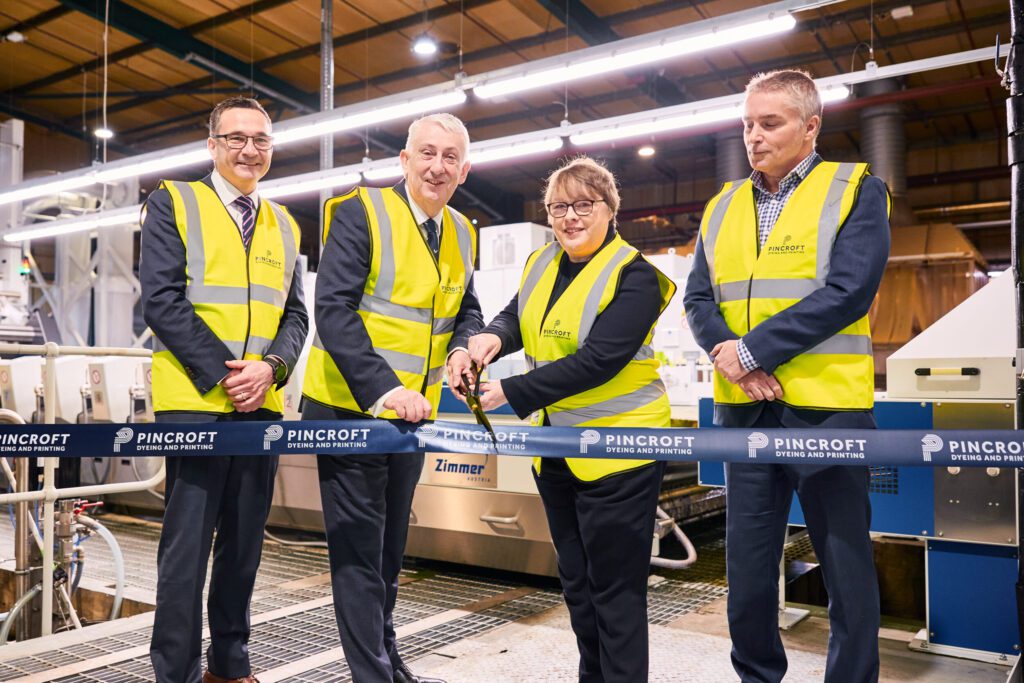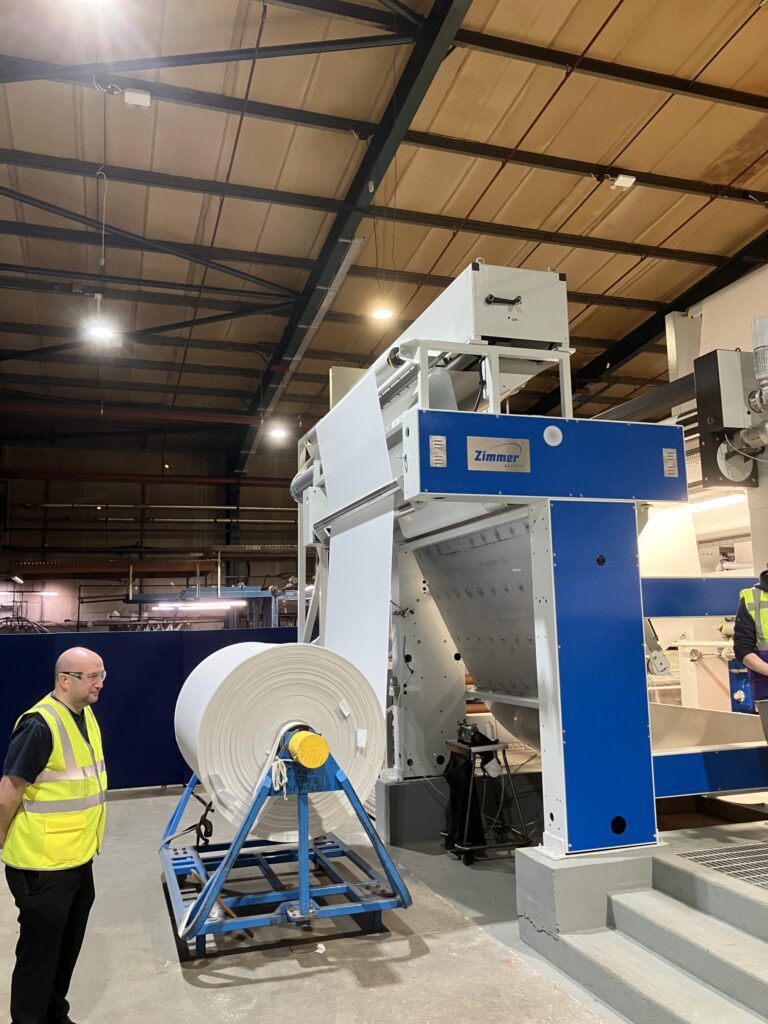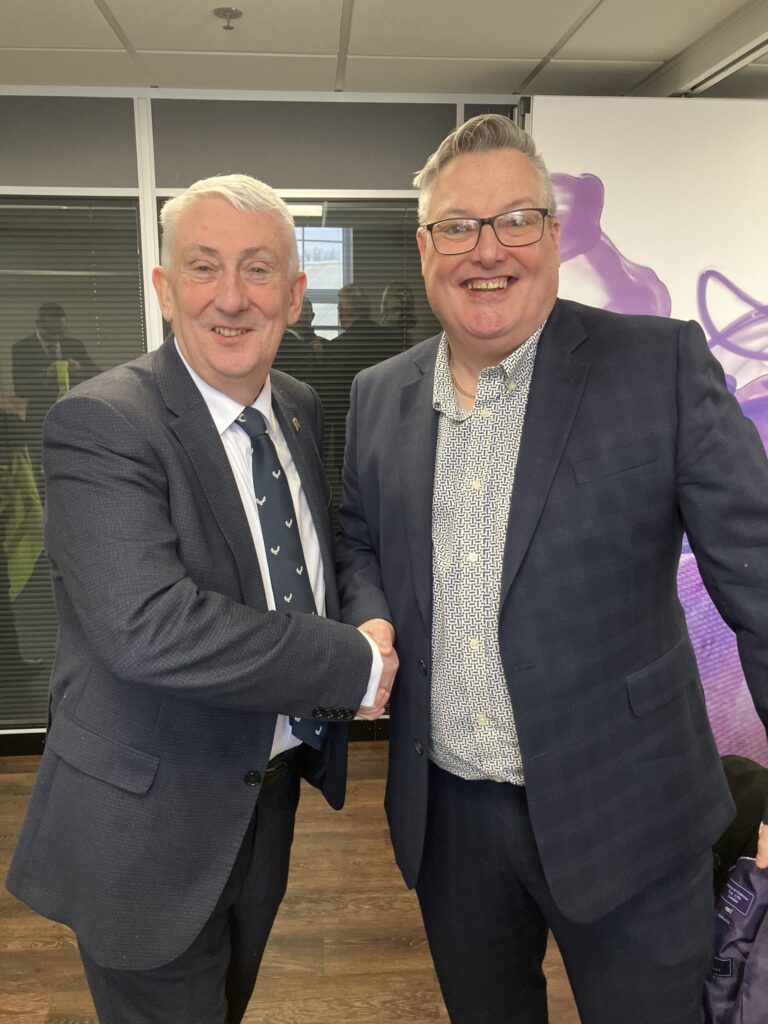UKFT joins UK government leaders to celebrate Pincroft’s £1.5m military textile printing expansion
10/02/2025
UKFT was delighted to join high profile officials at an event at military fabric printer Pincroft’s Adlington factory to celebrate a £1.5 million investment in cutting-edge rotary printing technology. During the visit on 7 February 2025, Pincroft also announced it has brought rotary laser engraving technology in-house, further strengthening its domestic capabilities in camouflage fabric production.
The event was attended by prominent figures including Sir Lindsay Hoyle MP, Speaker of the House of Commons and Member of Parliament for Chorley, Maria Eagle MP, Minister of State for Defence Procurement and Industry, and Pincroft’s CEO John Vareldzis, alongside Managing Director Mike Collins. In a symbolic moment marking the company’s military printing expansion, the officials cut the ribbon in front of a small group of directors and industry guests, underscoring the significance of UK-based expertise in military textiles. Discussions focused on the importance of reshoring camouflage fabric production, reinforcing national supply chains and the wider benefits for local employment.

Pincroft: New Printer Unveiling (L-R) John Vareldzis (CEO), Sir Lindsay Hoyle MP, Maria Eagle MP, Mike Collins (MD).
Sir Lindsay Hoyle said: “This is a major investment creating high quality jobs, but most of all, producing the best camouflage in the world being printed here. We look forward to the United Kingdom wearing printed uniforms from Adlington.”

Maria Eagle MP added: “The impact of having the capability in the UK to make uniforms to these standards is quite clear. It means that you can keep the intellectual property of how you’re designing your uniforms local, instead of them being sent around the world. To have the capability to do that here is a very powerful sovereign strength.”

Sir Lindsay Hoyle MP and UKFT’s John West
UKFT’s Director of Skills and Training, John West, said: “It was a privilege to see the unveiling of the state-of-the-art printing machine, which is a game changer for Pincroft. The event was also a valuable opportunity for UKFT to engage with Ministers on the strengths of the UK textile industry, highlighting our skilled workforce and training programmes. We also raised the need to review procurement processes, ensuring UK textile companies have fair access to supplying our armed forces with the high-quality clothing and accessories they deserve.”
John Vareldzis said: “The scale of today’s visit and the calibre of attendees demonstrate the strategic importance of this investment – to ourselves, the local area and the UK. With many decades of military printing experience, we now have one of the best rotary printing technologies available. This positions us to meet our customers’ evolving needs, explore new markets and offer greater versatility, including lighter fabrics.”
Pincroft’s Mike Collins highlighted: “This investment presents a huge opportunity for growth. By adding this additional equipment, we have increased our annual capacity to over eight million metres, ensuring we are well-positioned to meet growing customer demand.”
Pincroft’s new investment includes a Rotascreen TG by Austrian manufacturer Zimmer, with 12 printheads and a magnet system to ensure greater precision, faster reorders and uniform coverage. To further enhance production, Pincroft has also brought screen-making in-house with the SPGPrints bestLEN direct rotary engraving system. This allows for greater flexibility, creativity and speed when producing new designs for customers – from concept to printed fabric.
Technical textiles – enabling technology
UKFT is continuing to emphasize to policymakers the diverse applications of textiles, from luxury fashion to advanced manufacturing, with the aim of changing how the government perceives the industry. While fashion is usually categorised under creative industries or retail, textiles transcend boundaries, impacting advanced manufacturing and technology. One of our aims is to shift this narrative to highlight textiles as an enabling technology critical to various sectors.
Another of our key priority policy areas is around public procurement, aiming to reform rules post-Brexit to prioritise UK manufacturers, especially in technical textiles, supporting advanced manufacturing capabilities across multiple sectors.
